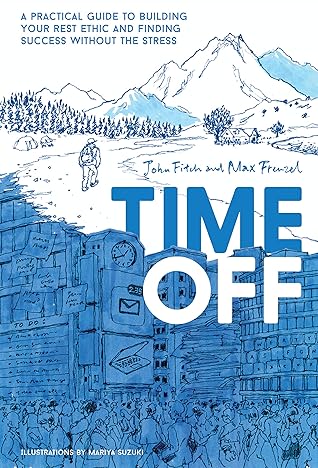More on this book
Community
Kindle Notes & Highlights
by
John Fitch
Read between
January 24 - January 25, 2021
For much of human history, work was largely unsupervised and people were free to go about their craft – and life – in any way they wanted, as long as there were results.
Time is now currency: it is not passed but spent.”
When time became a valuable currency that could be traded for money, leisure’s value declined. Worse, leisure became genuinely wasteful, the equivalent of burning money. If you didn’t produce anything with your time – if there was no output – you wasted
Four hours a day, if they are genuinely focused, spent on the right things, and supported by good rest, are really all we need to achieve great things. It’s an idea that flies in the face of our busyness culture.
much of modern society seems to fear idleness (or what we now more often call boredom) as possibly one of the worst things in existence.
The world pushes us to add because that benefits them. But the secret is to focus on subtracting. The adding mindset is deeply ingrained. It’s easy to think I need something else. It’s hard to look instead at what to remove.”
someone who says yes to almost everything, stretching themselves thin, is going to produce shallow work. Or they’ll blow their deadline (failing to “ship” as he terms it). Or they’ll burn out and produce no work at all.
“The future,” Watts writes, “is made up of purely abstract and logical elements – inferences, guesses, deductions – it cannot be eaten, felt, smelled, seen, heard, or otherwise enjoyed. To pursue it is to pursue a constantly retreating phantom, and the faster you chase it, the faster it runs ahead.”
Alan considered the entire idea of self-improvement nonsensical: “I can only think seriously of trying to live up to an ideal, to improve myself, if I am split in two pieces. There must be a good ‘I’ who is going to improve the bad ‘me.’” Such separation, he reasoned, would only worsen his issues, not improve them.
many of us obsess over self-improvement, reading book after book and attending seminar after seminar, but are nonetheless unwilling to be still and reflect on who we really are. This investment in self-development isn’t “growth”; it’s a defense mechanism.
“A good traveler has no fixed plan, and is not intent on arriving.”
Because of the sabbaticals, we started to do more things that other design studios don’t do, so we completely took ourselves out of this price game. It wasn’t like we did the same stuff that other design studios did and clients would just go with the cheapest. So even financially it turned out to be successful, but of course, that was not the reason to do it. The biggest thing I got out of the sabbatical was that I could continue looking at design as a calling rather than a job. And that’s a big deal because getting bored with the things that you do is a giant problem in most professions.
“the cost of a thing is the amount of what I will call life which is required to be exchanged for it, immediately or in the long run.”
“In the winter on a Sunday afternoon, I can spend six hours in front of the fireplace, just looking at the flames and thinking. In the evening, I’m drunk with beautiful thoughts,”
If what you do can easily be written down as a set of rules and instructions, you will be replaced – either by machines or by cheaper labor. It doesn’t mean this work is easy; it just won’t be as valuable in the future.
Deep learning, the most prominent current form of AI, is extremely powerful. But, at its core, it is really nothing more than a fancy type of statistical analysis of large amounts of data.
empathy “does not begin with ‘I know how you feel.’ It begins with the realization that you don’t know how another feels.”
Soft Skills will be Hard Currency
“Even in our instant-gratification society, being available all day isn’t necessary. You just need to communicate when you are available.”


